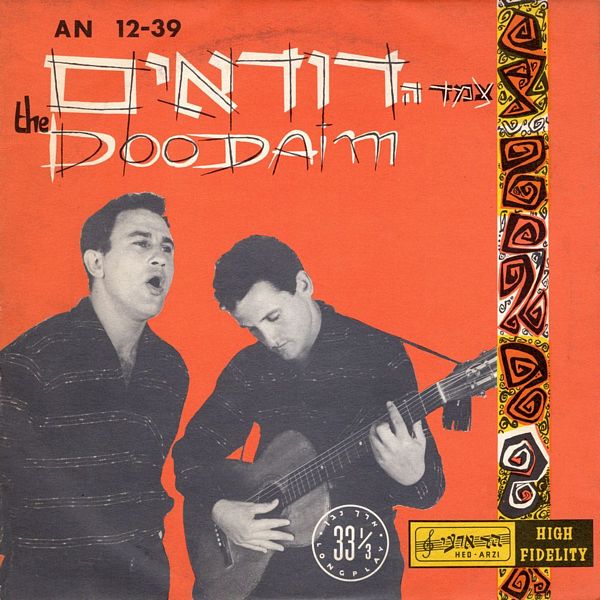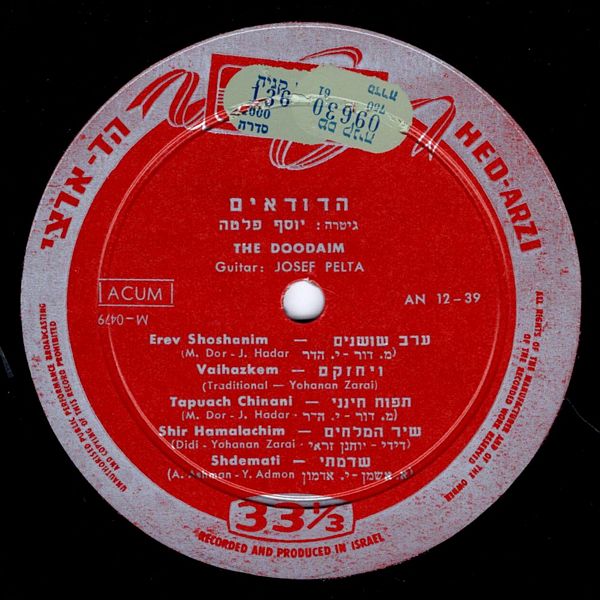

 |


 |
Sleeve Notes
THE SONGS
EVENING OF ROSES (EREV SHEL SHOSHANIM) — a tender and touching song of love, one of the most popular hits in Israel during the past year. "Night falls softly, bringing the perfume of lilies. Come, let me softly whisper a song of love to you".
AND THEY WILL BE STRENGTHENED (VE-YEBEN UZIYAHU) — In the time of King Uziahu, the reserve soldiers were never short of work. This foresighted monarch saw to it that towers were constructed in Jerusalem, and he also prepared fortresses in the desert, to anticipate any evil that may come.
BEAUTIFUL APPLE (TAPUAH CHENANI) — Another song of love. The maiden goes into the garden, picks a beautiful red apple and kisses it. The youth peeps out from among the trees, envious of the apple which has been kissed by the maiden, and embraced by the breeze.
SONG OF THE SAILORS (SHIR HAMALACHIM) — a group of merry sailors (somewhat drunk) in a song in which they declare themselves to be "Satan's merry boys". Hearing the song, it is natural to presume that they are right.
MY FIELD (SHDEMATI), an old song dating back to the days of the second aliyah (second immigration), and renewed by the "DOODAIM". Song of the farmer planting his fields with sunrise, and who rejoices in his harvest, brandishing on high his shining scythe.
SHEPHERDS' SONG (SHIR HANOKDIM) — A quiet pastoral on an ancient subject, the charm of which will never die. The shepherdess whose sheep are dispersed among the hills, and the youth in love, who is willing to take the place of the lambs, in order to win the caresses of the beautiful shepherdess.
CAMEL CARAVAN (GEMALIM POSS'IM) — Some decades ago, camels wended their way over the sand dunes on which present day Tel-Aviv is built. Today, the children of Tel-Aviv can see camels only in the Zoo. But south of Beer-Sheba, camels are still traversing the desert, driven by Bedouin residents of the Negev.
SONG OF THE JACKAL (SHIR HATAN) — Little children and baby jackals are afraid of each other, but at night, when they are hungry, the have one thing in common — they cry. — The wail of hungry child and jackal pierce and make fearful the quietness of the night, and must also disturb our own serenity.
ON THE TRACK TO BEER-SHEBA (BAMSILAH LE'BEER-SHEBA) — A railway track has been laid across the south of the Negev in the direction of Beer-Sheba. The entire desert recedes before this new creation, which has suddenly invaded its territory, and the actuality and the Bible mingle together until even Abraham the Father, resident of Beer-Sheba, comes down to the tracks and waves the green flag "Everything O.K." (Hakol Beseder) — "You may pass" (Ata Yachol La'avor).
"THE DOODAYIM"
There are "privileged" singers who are averse to giving encores, however much the audience may applaud them at the end of their performance. At first, their faces register displeasure, and it is only after the hand-clapping has reached a climax (if at all), that they condescend to render one or two pieces, before leaving the stage. Why do they behave so? In order to retain the sense of their "artistic respect", and possibly because they have no more songs in their repertoire.
The "DOODAIM" do not belong to this variety of singers. On the contrary, they are willing and prepared to give encore performances, if they are convinced that their audiences really desire them. Sometimes, Benjamin and Israel remain with their audiences for many hours after the close of the performances, singing scores of songs in quick succession, and without even the solitary repetition of any one song. Their repertoire is wide and varied, and they add a new song almost daily.
Why? The answer is very simple. The "DOODAIM'' love to sing. Theirs is love for singing and folk song at first sight. They first met at a Youth Social Gathering in Jerusalem, some years ago, these two young Jerusalemites — Benjamin (Benny) Amdurski, aged 27, and Israel Gurion, aged 23. Israel sang at this gathering, whilst accompanying himself on the guitar. Benny joined in, and it suddenly dawned on those present "that something was cooking". The two youngsters coordinated each other wonderfully, in appearance, voice and performance. The audience gave them unstinted applause, and they continued with song after song until dawn.
Such was the birth of the "DOODAIM". At first, the two sang only at friendly gatherings, youth and student meetings in the Capital. Later came the idea of public performances at the Theatrical Club (Moadon Hateatron) in Tel-Aviv. They adopted the stage name of "DOODAIM" (which smacks of both the Bible and Love), and a standard mode of dress (trousers and grey shirt) and commenced to appear. They were a tremendous success, and immediately became the most successful pair of singers in the country. They gave a daily radio programme, and received offers to perform, from all parts of the country. Probably the best proof of their success is the plentiful growth of other pairs and trios of singers who are endeavouring to copy the "DOODAIM".
The "DOODAIM" are probably the only pair of artists in the country with neither enemies or opposers. They are liked by all, for their charm and simplicity, their pleasant voices and clear diction, the new ring they have introduced into the songs of Israel, and for their serious approach, on account of which they are continually developing and renewing their repertoire, to which they are adding a new song almost daily.
Only six months ago, Benny and Israel were just two young Jerusalemite sabras, singing only for their friends at private gatherings and parties. Today they are the most sought after pair of singers in the country. Whoever sees them and hears their singing (even from this, their first full recording) will have no difficulty in understanding the cause for their unprecedented success.
DAN ALMAGOR